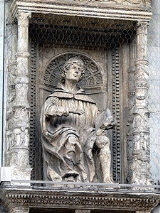
, author
, and magistrate
of Ancient Rome
. Pliny's uncle, Pliny the Elder
, helped raise and educate him. They were both witnesses to the eruption of Vesuvius on 24 August 79 AD.
Pliny is known for his hundreds of surviving letters, which are an invaluable historical source for the time period.
He (Pliny the Elder) used to say that "no book was so bad but that some good might be got out of it."![]()
By then day had broken everywhere, but here it was still night-no, more than night.![]()
That indolent but agreeable condition of doing nothing.![]()
Objects which are usually the motives of our travels by land and sea are often overlooked and neglected if they lie under our eye...We put off from time to time going and seeing what we know we have an opportunity of seeing when we please.![]()
His only fault is that he has no fault.![]()

